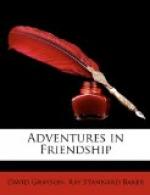And one of these words—how it brings to me the very mood of a gray October day! A sleepy west wind blowing. The fields are bare, the corn shocks brown, and the long road looks flat and dull. Away in the marsh I hear a single melancholy crow. A heavy day, namelessly sad! Old sorrows flock to one’s memory and old regrets. The creeper is red in the swamp and the grass is brown on the hill. It comes to me that I was a boy once——
So to the flat road and away! And turn at the turning and rise with the hill. Will the mood change: will the day? I see a lone man in the top of a pasture crying “Coo-ee, coo-ee.” I do not see at first why he cries and then over the hill come the ewes, a dense gray flock of them, huddling toward me. The yokel behind has a stick in each hand. “Coo-ee, coo-ee,” he also cries. And the two men, gathering in, threatening, sidling, advancing slowly, the sheep turning uncertainly this way and that, come at last to the boarded pen.
“That’s the idee,” says the helper.
“A poor lot,” remarks the leader: “such is the farmer’s life.”
From the roadway they back their frame-decked wagon to the fence and unhook their team. The leader throws off his coat and stands thick and muscular in his blue jeans—a roistering fellow with a red face, thick neck and chapped hands.
“I’ll pass ’em up,” he says; “that’s a man’s work. You stand in the wagon and put ’em in.”
So he springs into the yard and the sheep huddle close into the corner, here and there raising a timid head, here and there darting aside in a panic.
“Hi there, it’s for you,” shouts the leader, and thrusts his hands deep in the wool of one of the ewes.
“Come up here, you Southdown with the bare belly,” says the man in the wagon.
“That’s my old game—wrastling,” the leader remarks, struggling with the next ewe. “Stiddy, stiddy, now I got you, up with you dang you!”
“That’s the idee,” says the man in the wagon.
So I watch and they pass up the sheep one by one and as I go down the road I hear the leader’s thick voice, “Stiddy, stiddy,” and the response of the other, “That’s the idee.” And so on into the gray day!
My Open Road leads not only to beauty, not only to fresh adventures in outer observation. I believe in the Open Road in religion, in education, in politics: there is nothing really settled, fenced in, nor finally decided upon this earth, Nothing that is not questionable. I do not mean that I would immediately tear down well-built fences or do away with established and beaten roads. By no means. The wisdom of past ages is likely to be wiser than any hasty conclusions of mine. I would not invite any other person to follow my road until I had well proven it a better way toward truth than that which time had established. And yet I would have every man tread the Open Road; I would have him upon occasion question the smuggest institution




